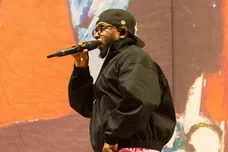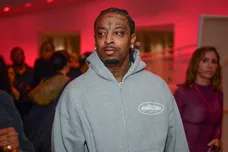In 2005, the largest residential disaster in U.S. history hit the South and destroyed the city of New Orleans. 80 percent of the city was flooded, with flood waters ranging from one to ten feet in depth. The city was in ruins, leaving over a million people in the Gulf Coast region displaced. And in New Orleans alone, 134,000 housing units were swept away with the water.
NOLA residents born and bred, were forced to leave their homes and everything else behind with it, in hopes that they would soon return to rebuild their communities. Nine years later, the people of New Orleans are still rebuilding homes, schools, neighborhoods, and lives. The music scene is no different. NOLA has always been a fault line for music, first with Jazz and then more recently with hip hop. NOLA rap culture has been around since the 80s, putting the city on the map, especially in the underground music scene. But the damage of the storm proved to be much stronger than anyone expected. Artists and record companies native to N.O., like Cash Money and No Limit, had no choice but to relocate to other states and lay low. Despite the permanent damage Hurricane Katrina inflicted on so many lives, some artists and producers have managed to return to their city and record music there, proving that even a storm can’t entirely crush the New Orleans spirit.
Pre-Hurricane Katrina, NOLA was a part of the bounce movement in the 90’s which then led to the Dirty South movement in the 2000s. If you’re not sure what bounce is, think of chants over a Triggerman beat—the beat in T.I and Lil Wayne’s “Ball” pretty much. Dirty South gave New Orleans rap an official place in the mainstream hip hop world. It started in the late 80s after the slow migration of hip hop culture from places like Los Angeles and New York City. Thanks to Cash Money Records and No Limits Records, both originally based in New Orleans, NOLA rap became famous all over the world, giving rappers like Lil Wayne and Curren$y a chance to show the rest of us that the South is truly talented.
While the mainstream hip hop scene has had it’s ups and downs over the years, the underground culture has always stayed constant, whether the rest of us knew about it or not. You may or may not have heard of some of these artists, but it doesn’t mean they haven’t made a huge impact in the hip hop world. Some underground artists who are also local legends include 17th Ward duo Partners N Crime, Nutt da Kidd, and rapper Allie Baby. Allie Baby is one of the few female rappers in the game, and she’s good at what she does. A New Orleans native, Allie Baby started out in group Blak lyce and then moved on to Gs Up, a group started by Lil Scrappy. Before Katrina hit, she was working on her music and pursuing a career in acting in New Orleans, nabbing roles in movies like “Da Block Party” and “Black Saturday.”
Allie Baby has spoken openly of how horrific the Katrina experience actually was for her and everyone she knew. She described the tension that showed through in a lot of New Orleans hip hop post Katrina. “Everybody wanted to put a message in their music. A lot of people were pissed at the government, a lot were pissed with the mayor, and FEMA’s late response. And there was so much that was going on at the time,” she said. She says that her own music changed in certain ways after the storm, “My music changed in a more combative approach, because I had a lot on my mind. I did lose family, we did lose homes, and it was a hard time.” While Allie Baby describes Hurricane Katrina as both a blessing and a curse musically, because it also led to the spread of New Orleans culture through displaced civilians, she says the impact was irreparable. “It wasn’t just a natural disaster it was a disaster for our culture.”
Hip hop artist and producer Truth Universal came to NOLA from Trinidad at the age of four, but considers himself a New Orleans native all the way. Truth Universal’s sound varies from the typical bounce sound that other NOLA rappers have adopted. His songs all come with a political message that are the complete opposite of lyrics of excess over at mainstream labels like Cash Money Records. “I’m groomed on that golden era kind of like traditional hip hop style,” he said. “Not to say I don’t incorporate or you can’t hear remnants or elements of Southern rap and hip hop in my music.” Nevertheless, he’s an integral part of pre and post New Orleans underground hip hop culture. He is also responsible for the underground hip hop showcase Grassroots, which had been going on for about a decade and just recently held it’s last event. “I didn’t feel like the city’s venues were catering to us,” he said. “I think it’s worked out pretty good.” Truth Universal got his start in around 2000 in an emcee battle called Mic Check 2000. That was around the same time he dropped tracks like “Daishiki Dialogue” and an EP called Plantation Grafitti.
After Katrina hit in 2005, Truth Universal was forced to relocate to Houston, Texas. “I started really touring in about 2001 so I was already getting out, but after the storm it just kind of opened more doors because a lot of us were spread out in different places,” he said. After the storm, the political disillusionment and tension in race relations were two major things that changed his outlook on his own music and message. But he still sees some positive in the fact that New Orleans' bounce music was able to spread through all of the displaced artists. “[Bounce] caught on like wildfire after the storm and that was because of some of the artists residing in Texas, Atlanta, places in the Midwest and Northeast as well, so that helped to spread bounce.”
Truth Universal still grapples with the fact that while most artists have returned, many of their core members have stayed back and built new lives in new places. “You leave and you don’t have a residence to come back to,” he said. “You don’t have that network to go back to, you don’t have those legacies or residences that you can come back to.” His own mother made the decision not to return to New Orleans after Hurricane Katrina. “She actually was visiting in Columbus, Ohio when the storm hit and my brother had already moved to Columbus,” he said. “But after the storm she stayed there, and eventually moved to Atlanta with another brother of mine, and she hasn’t come back. It’s because her house was destroyed,” he said. Since then, Truth Universal has moved back to New Orleans and has made it his home base again, even though many of his friends and family have not returned. In 2008, he released his debut album Self-Determination under Dragon’s Breath Records. His most recent album, Invent the Future was just released this past October.
Allie Baby also fled to Atlanta with family when their homes were destroyed in the flood. She and her sister were the first out of her family to head back. And since then, she's moved back to Atlanta to pursue music, and only recently returned to New Orleans to pursue an acting career as well. “Our hip hop scene was gone,” she said.
The hip hop scene aside, Allie Baby described the city today as if eight years have not even gone by.
“There’s still a lot of homes that look like what you guys saw on TV, with the numbers of the dead bodies, and a lot of houses still have the spray paint on there,” she said. “A lot of neighborhoods, a lot of communities still look like what it looked like two days after Katrina, I kid you not.”
From schools to hospitals to the projects, Allie Baby said that so many historical and significant parts of the city still haven’t been rebuilt. Besides her acting career, Allie Baby is working on a mixtape with DJ Smalls, called Wifey: Married to the Game, set to come out this month.
Allie Baby, Truth Universal, and other artists like them are proof that the underground rap scene in New Orleans is slowly rebuilding itself. And while the hip hop culture is starting to regain its footing again after eight years, to these artists, it might never be the same.
“We said this eight years ago when it was brand new, when it was all still fresh. We said that the city would never be the same. And eight years later, it still isn’t the same,” Allie Baby said. “I really don’t even know how to put it into words. It’s just like a piece of us is missing.”







